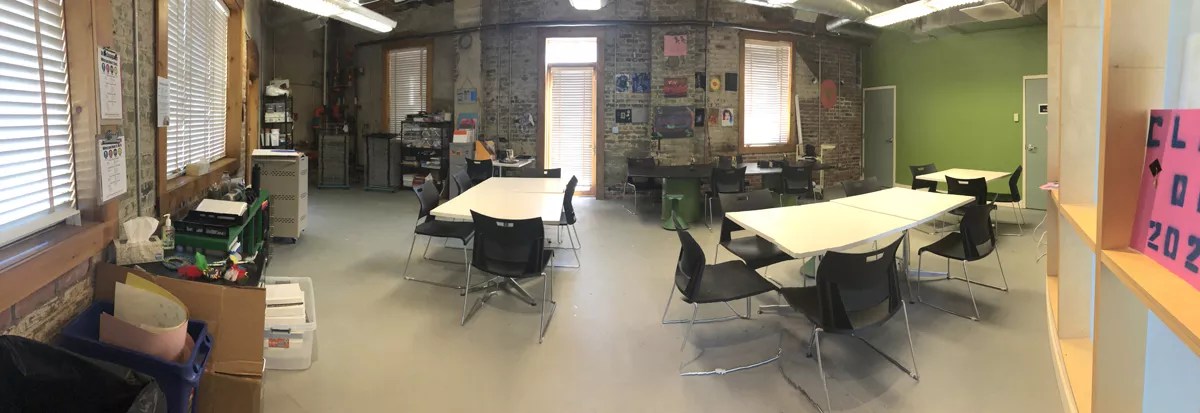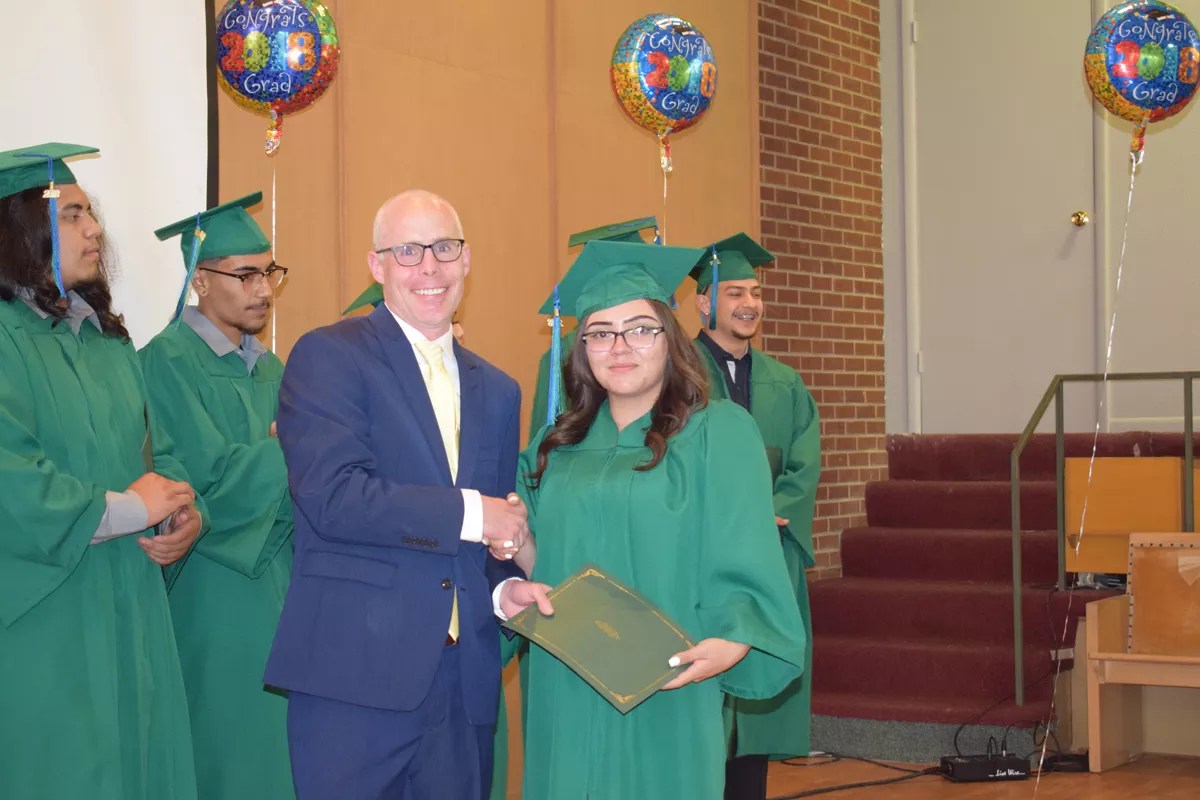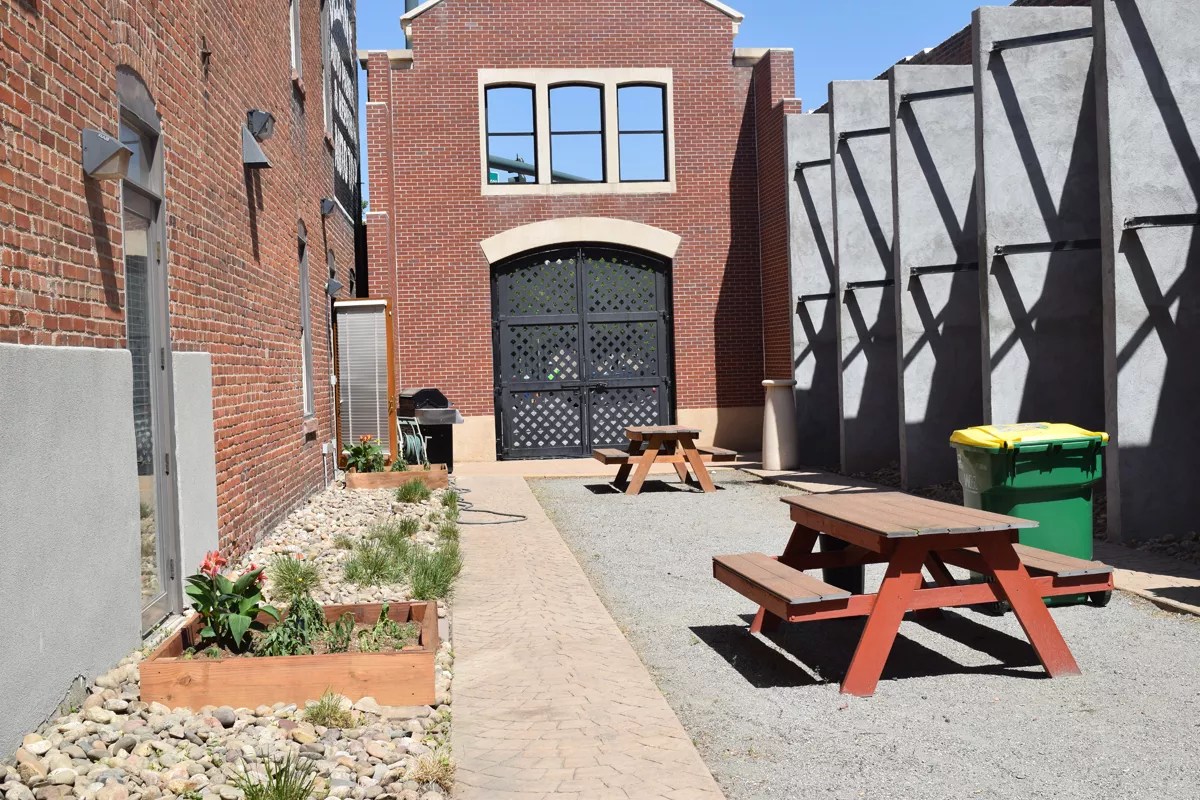
iStock

Audio By Carbonatix
On April 24, Sherri Villalobos and her friends were heading back to school after lunch when they spotted what they thought was a bad car accident. Denver Police Department cruisers had swarmed the street outside RiseUp Community School at 2342 Broadway, right across from the Denver Rescue Mission. But as they got closer to their school, a Denver Public Schools charter, the students saw cops in the back alley with their rifles drawn. This wasn’t a car accident, Villalobos realized.
She started calling people inside the building to find out if the campus was on lockdown, her anxiety growing by the second. “There’s cops everywhere,” she remembers thinking. “What if they just open fire right here?”
While the scene was just blocks from the center of downtown, the incident wasn’t made public until May 16, when social-justice group Padres & Jóvenes Unidos notified the community. “At RiseUp, DPD opted to put students and teachers in harm’s way, and neither they nor DPS have articulated why or how this decision was made,” the organization said in a statement. “The RiseUp community and Padres & Jóvenes Unidos calls on the DPS School Board to investigate how the Department of Safety arrived at the decision to authorize DPD officers to enter RiseUp without a warrant, or the consent of school leaders.”
Hours later, the police department released its own statement offering its version of what had happened that day.
Officers had gone to RiseUp to look for a suspect wanted for attempted first-degree murder in Lakewood: “Officers received information that the suspect was in the school, and given the nature of the allegations, believed the suspect posed a possible threat to students and staff,” the DPD statement read.
According to police, they searched the building and didn’t find the suspect or draw their weapons at any point.
But staffers at RiseUp say that officers brandished weapons at a teacher outside the building and entered the school even though they were told repeatedly told that the suspect wasn’t there that day. After consulting with the Denver Department of Safety, police began a room-to-room search for the student. According to RiseUp principal Lucas Ketzer, officers pushed aside a teacher standing outside her classroom who refused to let them in without a warrant. They also mistook three students for the suspect, he adds – two outside the building and one inside.
The day after the incident, teachers gathered students into circles to discuss what had happened and to ask how it had made them feel. If students weren’t on campus on April 24, they were told what had gone on.
“It [made] us look like a crappier school than we are,” Villalobos says. “Especially being right here, across the street from Denver’s largest homeless shelter. When all the cops were here that day, they looked at us like we were troubled.”

RiseUp
Courtesy of Lucas Ketzer
Established in 2014, RiseUp is one of twenty Alternative Education Campuses – schools that accommodate at-risk populations – in the DPS system. The charter school specializes in teaching students who have either dropped out of school or are at risk of dropping out, or have a criminal background or a history of child abuse or neglect, among other criteria.
About 100 students were enrolled at RiseUp this past school year; of those, 81 percent were Hispanic, 10 percent black, and about 4 percent each white and Native American. About two-thirds were male, and 78 percent qualified for free or reduced lunch. Very few had entered the school as true freshmen; most had either dropped out and were trying to recoup lost time in order to get a diploma, or they were counseled out, meaning a guidance counselor at their previous school had warned them that they were at risk of failing and pointed them to alternatives.
A traditional public high school might see those students as incapable or lost causes. But Ketzer says RiseUp regards them as learners who aren’t built to conform to the traditional educational model, whether because they come from a rough household or because a brown kid from east Denver tunes out during English and fails when he can’t relate to Faulkner.
“A lot of our students come from systems of power in which they’re seen as less than and don’t necessarily have great perceptions of school,” Ketzer says. “So we have to break down those perceptions and show them how they’re different. And that’s about building relationships.”

Lucas Ketzer and Sherri Villalobos during graduation ceremonies in May.
Courtesy of Lucas Ketzer
Villalobos was hanging out at RiseUp on May 25, the last day of school, even though she’d graduated a few days earlier. She knows her schedule probably won’t allow it, but she still wants to visit every day next year, when she’ll start working toward her associate’s degree in social work at the Community College of Denver.
She enrolled at RiseUp in January 2016 at her mother’s suggestion and became one of its first pupils (the school had spent its initial year accumulating teachers and writing curriculum). RiseUp was Villalobos’s fifth high school in three years. It was a rough time in her life. She was into drugs and had been suspended from Wheat Ridge High School and charged with assault after getting into a fight. At RiseUp, she expected a typical alternative school full of bad students and frustrated teachers.
But what she found was unlike anything she’d experienced at any other school.
RiseUp had been inspired by a charter school in California that lets students take classes for half the day and work the rest. That exact system couldn’t work in Colorado, though; students in charters here must still “learn to the test” and take the same annual assessments as students in traditional public schools, making half a day away from curriculum difficult. But RiseUp’s founders could still focus on creating a school that considered the challenges of its student population.
RiseUp has several mental-health professionals on staff, as well as counselors who help students find jobs and housing. There’s also a food bank that’s open 24 hours a day, seven days a week.
The school breaks its courses into six-week sessions rather than traditional semesters. Ketzer says that allows students who might need to work while attending school or even have to leave for a semester to jump back into their coursework faster than at a traditional school. Teachers build the six-week courses around topics of their choosing that they think students will connect with, anything from a study of masculinity to the history of hip-hop to women’s studies to migrant issues, and they incorporate into the session two or three of the school’s eight course competencies: communication, collaboration, creativity, critical thinking, cultural responsiveness, civic engagement, social and emotional development, and career-specific goals.
“The teacher’s job is to support all of our students and really help them find their voice.”
Teachers must still teach core subjects so that students can pass standardized tests, but they try to incorporate approaches to math, science, language and history that connect with students.
“[The courses] are about things students can get interested in, and then we teach them the skills through that content,” Ketzer explains. “So instead of reading Shakespeare, they’re reading Enrique’s Journey. The reading skills are the same. You’re analyzing and synthesizing text, but it’s a text our kids can relate to.”
Students aren’t regularly tested throughout a RiseUp course. Instead, the six-week sessions culminate in projects that students present to a panel of their teachers and volunteers. During their presentations, they’re asked questions about the steps that they took to complete the project and what they learned about themselves in the process. The panel’s marks and the student’s own assessment are taken into account for the final grade.
In a traditional public school, teachers are above students, Ketzer says: They assign, they grade and they discipline. But at RiseUp, students are above teachers. For example, if students choose to leave the campus in the middle of the day and miss class, they aren’t sent to the principal if and when they return. Instead, their teacher or Ketzer might talk to them about how their choice will impact their progress on their class project. The goal is for students to walk through consequences preemptively.
“The teacher’s job is to support all of our students and really help them find their voice and help them cultivate what they’re passionate about,” Ketzer adds. “You see a lot of student choice here, a lot focused on community self-awareness. What’s your role in the community, how can you impact your community and your family? What do you really want for yourself?”
RiseUp is probably among the more liberal AECs in Denver, he says, acknowledging that its methods don’t work with every student. The freedom can be overwhelming, especially for the younger set, and graduation rates are impacted by students who are allowed to take more time to get their diploma. RiseUp has students as old as 21 and an on-time graduation rate of 24.6 percent, which is among the lowest in the district.
But the school operates knowing that students are walking in with significant baggage that they can’t just leave at the door.

Courtesy of Lucas Ketzer
“We work a lot on social-emotional learning. Some of our students come with significant anger issues or don’t have conflict-resolutions [skills],” Ketzer says. “You can be great at math and a great reader, but if you tell your boss off, it’s probably not going to work out well for you.”
At RiseUp, Villalobos discovered her passion for social work and learned how to trust people. Every teacher in the building knows about her struggles, past and present.
“I have a cousin fighting for his life in the hospital right now,” she says. “Teachers here are texting me for support. At another school, I don’t think I’d be as comfortable explaining to them what’s going on. Here, at least one staff member has a student that always goes to them.”
The student suspected of attempted murder, a minor, eventually turned himself in to Lakewood police. Ketzer was at one of his court appearances in May, when his attorney asked the judge to reconsider giving him bail and the court was considering investigating whether his home was a suitable place to return to.
Ketzer and his staff are still determining how that day in April impacted students. It’s too early to know for sure, he says, but the incident might have had something to do with a significant drop in attendance between April and May, from 83 percent to 66 percent this year compared to the drop from 81 percent to 74 percent in 2017.
As police swept the campus, they’d asked a student they mistook for the suspect to stand and remove his cap. That student was in class the next day but then left RiseUp. He had always been reluctant to attend school, and that interaction with police might have pushed him over the edge, Ketzer suggests: “I reached out and talked to him and…he said, ‘Look I’m committed to coming back next year.’ While there’s no direct causation, it’s obviously complex.”
So is determining exactly what led to the incident at RiseUp on April 24, and what actually happened at the school.
In the days following the search, RiseUp’s director of family and community empowerment contacted Padres & Jóvenes Unidos to help the school sort out what had happened that day and how RiseUp should respond. The group asked RiseUp to collect statements from students and staff regarding the day’s events, then engaged parents in conversations to “drill down on the root cause of why we thought it had happened,” says Padres & Jóvenes Unidos spokesman Jacob Cousins. From those conversations came the decision to go public regarding the events of that day and to call for an investigation.
In a statement released after Padres & Jóvenes Unidos made the incident public, DPS said it would work “with our schools, community partners, and the Denver Police Department to ensure that our school-based policing practices preserve the safety and dignity of all involved.” (The district has not elaborated on any specific investigations into the events of April 24.)
Both the Denver Department of Safety and the Internal Affairs Bureau for the Denver Police Department have launched investigations. Ketzer says he’s been contacted by Internal Affairs staffers, as have members of his staff and a few students. “As of now, the investigation is still ongoing,” he says. “I’m just waiting to hear what the findings are.”
In the meantime, he says, he’s working with the Denver Board of Education to involve police in the school’s welcome-back activities and orientation, scheduled for the week of August 14: “Having those officers present, really allowing those officers and our students to interface – not like officers and students, but person to person – will go a long way in helping both our students and the officers build empathy toward one another.”